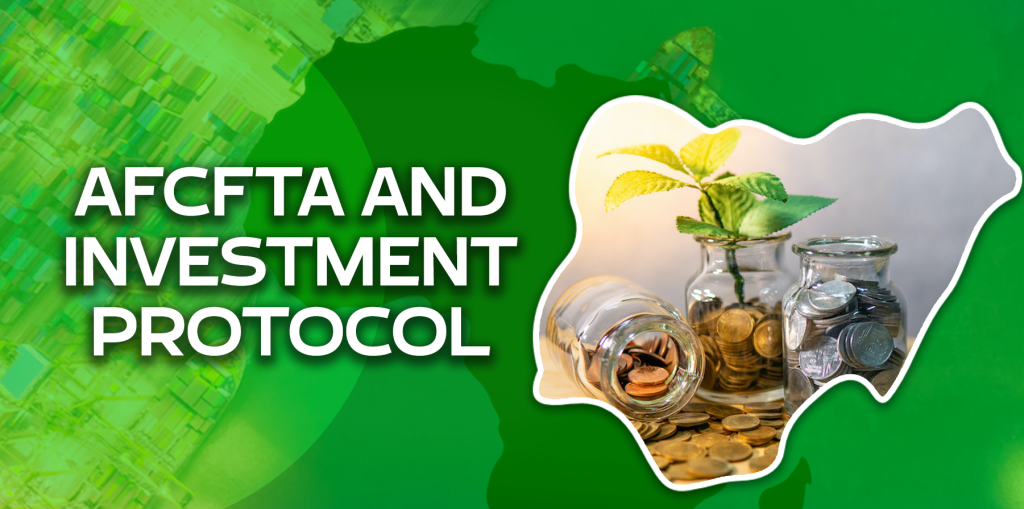AfCFTA and Investment Protocol
The African Continental Free Trade Area (AfCFTA) is the world’s largest free trade area. It began with an Agreement signed by the African Union (AU) member states in March 2018 bringing together 55 countries of the AU and 8 Regional Economic Communities (RECs). Its mandate is to advance trade in value-added production across all service sectors of the African Economy. The Agreement also aims to create a single continental market for goods and services and free movement of people and investment.
After the continuous continental engagements, the AfCFTA entered into force on the 30th of May 2019, with 24 member states depositing their instruments. The Agreement is divided into 7 parts and 30 Articles. In addition, there are Protocols, Annexes, and Appendices which form part of the AfCFTA Agreement.
One of such Protocols is the AfCFTA’s Investment Protocol. It was adopted at the ministerial level by the AfCFTA Council of Minister in October 2022 after undergoing a rigorous year-long process in December 2021. The end result was a finalized version that thoroughly defines intra-African investment protection, promotion, and facilitation, a pivotal component of the Agreement.
Several studies have highlighted the AfCFTA agreement and the Investment Protocol’s potential benefits. According to a UN Economic Commission for Africa report, the AfCFTA could increase intra-African trade by 52.3%, increase industrialization, and create new job opportunities. Similarly, according to the African Development Bank, the AfCFTA could boost Africa’s GDP by $450 billion by 2035. The AfCFTA Investment Protocol’s successful implementation will be critical to realizing the potential benefits of the AfCFTA agreement for African economies and people. Under this Protocol, investors are protected, disputes are resolved, and transparency is ensured for investments in the AfCFTA region. These and more are the pivotal features of the AfCFTA Agreement and the crux of this article.
In exploring the key features and relevance of the AFCFTA Investment Protocol, the first on the list is the establishment of a comprehensive legal framework for investment protection. The Protocol requires AU member states to provide fair and equitable treatment to foreign investors and to refrain from expropriating investments without compensation. It also requires member states to provide a transparent regulatory environment for investment and to ensure that foreign investors are not discriminated against on the basis of their nationality.
Secondly, is the establishment of a dispute resolution mechanism. The Protocol provides for the resolution of investment disputes between investors and the host state through arbitration. The arbitration process is governed by the rules of the United Nations Commission on International Trade Law (UNCITRAL) and is intended to be efficient, transparent, and impartial.
Furthermore, the AfCFTA Investment Protocol seeks to promote transparency in investment regulation. Member states are required to publish their investment laws and regulations, as well as notify foreign investors when those laws and regulations change. This requirement is intended to provide greater certainty and predictability in the investment environment for foreign investors.
There is no doubt that the AfCFTA Investment Protocol will transform investment rules on the continent. Part of its goals will aim towards achieving sustainable development rather than just investment protection. The Investment Protocol could simplify the existing regulatory regime, embody an African response to the challenges of attracting development-oriented investment, address the perceived legitimacy crisis of the international investment regime, and level the playing field for businesses. The AfCFTA Investment Protocol will also promote structural transformation on the continent, harness the business potential of private initiatives, and translate it into long-term outcomes for host communities. By creating a level playing field for all private actors, a more efficient and competitive private sector can thrive.
The AfCFTA Investment Protocol also calls for the formation of a Committee on Investment, which will be in charge of overseeing the protocol’s implementation and resolving any issues that arise. The committee will also be in charge of promoting investment in the AfCFTA region and assisting member countries in implementing the protocol.
Finally, in analyzing the challenges that may be posed to the AfCFTA, one of which is that, despite fully rationalizing the African investment landscape for African investors, international agreements with other economies will remain in place. The majority of them are from an older generation of treaties that may have implications for policy space. Regional treaties involving both African and non-African parties also straddle internal and external dimensions. In resolving these, policymakers must determine how they fit into continental integration by conducting a situational analysis and prioritizing the AFCFTA Agreement on the basis of the global challenges it seeks to put an end to.
Reference(s)
- “Protocol on Investment to the Agreement Establishing the African Continental Free Trade Area”. Tralac, accessed 30th April 2023.
- “About The AfCFTA”. AfCFTA, accessed 1st May 2023.
- “AfCFTA Protocol on Investment was concluded”. Investment Treaty News, accessed 2nd May 2023.
- “Chapter 3 The AfCFTA Investment Protocol: Reshaping the African investment regulatory landscape for sustainable development”. UNECA, accessed 3rd May 2023.

AfCFTA: Forge ties to diversify energy mix, NNPC tells African countries
To ensure sustainability of the energy sector on the continent, African countries must take advantage of the implementation of the African Continental Free Trade Agreement (AfCFTA) to diversify their energy sources into a sustainable, low-carbon energy mix, the Group Chief Executive Officer (GCEO) of the Nigerian National Petroleum Company Limited, Mallam Mele Kyari, has said.
READ MORE
Nigerian firm ranked 18th fastest-growing African business
The Financial Times has ranked a Nigerian-owned commodities export and trading company, Neveah Limited, as the 18th fastest-growing company in Africa, in its FT/Statista 2023 Africa’s Fastest-growing companies’ list.
READ MORE
Digital technologies key to inclusive growth in Africa – African Union Commissioner
Digital technologies could offer Africa a great chance to unlock new pathways for rapid, inclusive economic growth and job creation, according to Ambassador Albert Muchanga, the African Union’s Commissioner for Economic Development, Trade, Tourism, Industry and Minerals.
READ MORE
China-US tensions: What will this cost Africa?
The war in Ukraine and the rise in tension between Washington and Beijing have raised fears of another Cold War, marked by the division of the world into two blocs. A perilous configuration for the continent caught in the middle.
READ MORE
